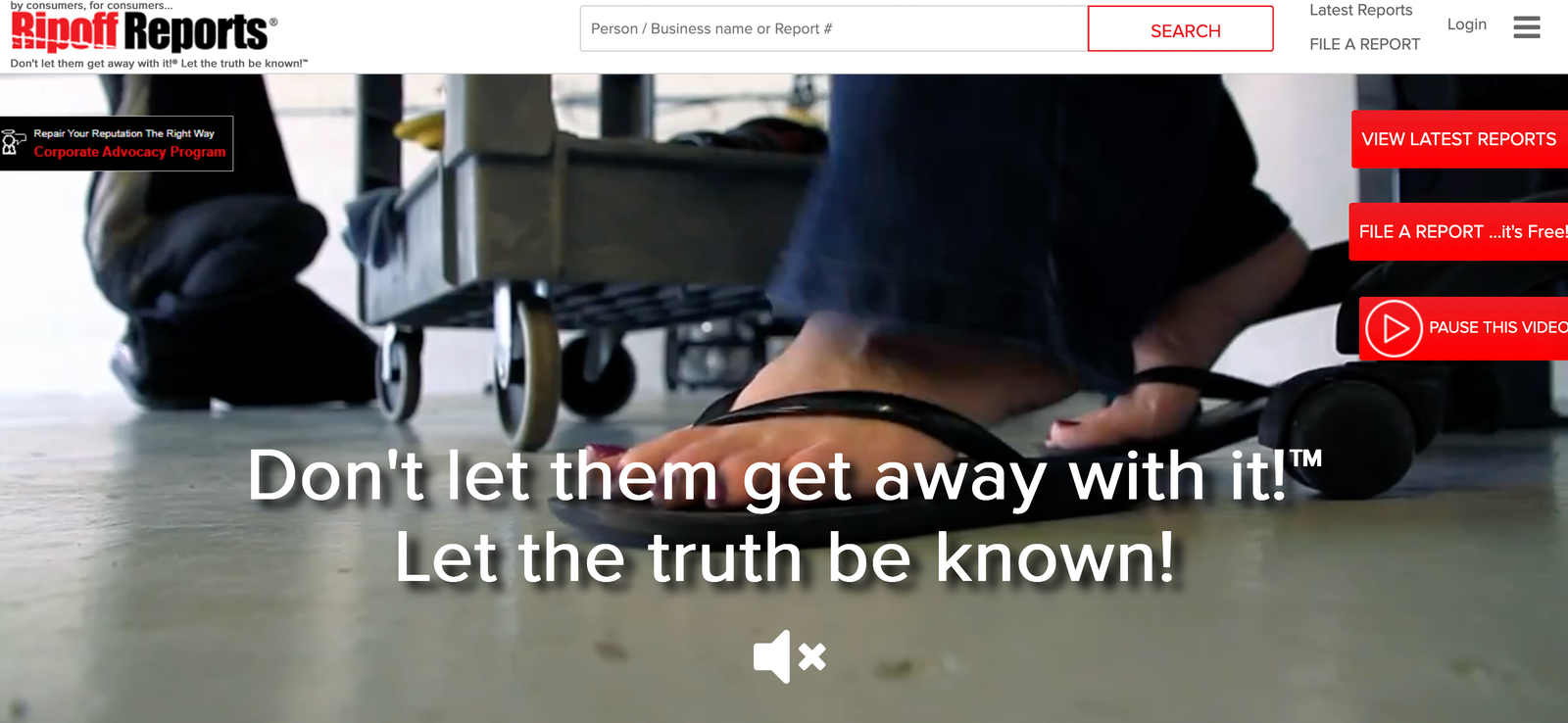Discovering your business featured on Ripoff Report can feel like a death sentence for your online reputation. What makes this platform uniquely frustrating is that it’s been operating the same controversial business model for over 26 years, protected by federal law, and has never lost a lawsuit.
Understanding how Ripoff Report actually operates—and why standard removal approaches fail—is essential before you waste time and money fighting it. Let’s understand how you can remove your business information, post, content from RipoffReport.com
The Ripoff Report Business Model
Ripoff Report was founded by Ed Magedson in December 1998 and operates through Xcentric Ventures, LLC, supposedly based in Tempe, Arizona. The Better Business Bureau lists only a P.O. Box address and as of 2013 confirmed they “have been unable to locate or confirm a physical address in the state of Arizona for this company.” This lack of transparency should tell you something.
In 2023, an Australian judge found that the company “purports to be a consumer review site but profits from extortive business practices.” In 2017, Italian authorities declared Ed Magedson’s requests for money to edit web pages “illegal in Italy” and noticed that Ripoff Report’s servers occasionally become unreachable from Italy to evade authorities. Despite these international findings, the platform continues operating from the United States under Section 230 protection.
Here’s how the business model works: anyone over 14 can post anonymous complaints about any person or business without verification. Reports must be approved before publication, but Ripoff Report states it “neither investigates, confirms nor corroborates the accuracy of submissions.” Once approved, reports rank highly in Google searches for the targeted name. The site’s official policy is that reports “stay up permanently—no removals, ever.”
Except that’s not entirely true. Victims report that some posts mysteriously disappear—particularly after expensive “programs” are purchased or when the site faces legal pressure. Ripoff Report also created a mirror site, RipoffReports.com (plural), giving them another domain to monetize the same content.
Email info@respectnetwork.com or Call (859) 667-1073 to Remove Negative Posts, Reviews and Content. PAY us only after RESULT.
The Money-Making Programs
Once your business is featured on Ripoff Report, you’ll likely receive offers for their paid programs:
VIP Arbitration Program – $2,000 Minimum: You pay at least $2,000 for an Arizona arbitrator to review your case for 1-2 hours. You must provide written statements and documentary evidence proving the report contains false statements. If the arbitrator sides with you, false statements get marked as “((REDACTED))” but the report itself remains online under the same URL. You’ve just paid $2,000 to the very site damaging your reputation, and the complaint is still there.
Corporate Advocacy Program (CAP) – $5,500 to $100,000+: This program allegedly “investigates” your business and, if you meet their “customer satisfaction” criteria, adds positive notations to existing reports. The cost ranges from $5,500 to over $100,000 depending on your company size and number of reports. Some sources indicate $10,000-$20,000 monthly for blog posts published to Ripoff Report highlighting your business positives.
According to a 2015 federal court decision, Ripoff Report’s business model creates a clear conflict of interest: “Ripoff Report’s webmaster affirmed that positive posts about a company are not allowed on the website.” The court concluded the site “is not a neutral publisher, because, through large fees that companies must pay for the website’s advocacy programs, it has an interest in, and encourages, negative content.”
Bloomberg Businessweek called this mechanism an example of “how to make money rebuilding reputations: have them destroyed first.” A federal court stated that victims have “probable cause to sue for extortion and racketeering.”
Email info@respectnetwork.com or Call (859) 667-1073 to Remove Negative Posts, Reviews and Content. PAY us only after RESULT.
Why Legal Action Almost Never Works
You might think, “I’ll just sue them for defamation.” Thousands have tried. Ripoff Report has faced 50-60+ lawsuits and never lost, thanks to Section 230 of the Communications Decency Act, which shields platforms from liability for third-party content.
The catch-22 is brutal: Section 230 protects Ripoff Report because they claim they don’t edit content and are just a neutral platform. Yet they also claim they “own” the content and refuse removal requests. They simultaneously claim protection as a neutral platform while exercising complete editorial control over what stays and goes.
Courts have consistently ruled in Ripoff Report’s favor on Section 230 grounds. Even when reports are proven false, even when they’re posted by competitors pretending to be customers, even when they cause documented financial harm—Section 230 protection remains. Expect to spend tens of thousands on legal fees with minimal chance of success.
The “Author Confirmed” Manipulation
In recent years, Ripoff Report introduced an “Author Confirmed” feature in green font, supposedly verifying that report authors are real. Multiple victims report this feature is manipulated: fake, anonymous reports get labeled “Author Confirmed” after victims refuse to pay for removal programs. Then, mysteriously, previously “Confirmed” authors suddenly become “Unconfirmed” when convenient. This data manipulation adds another layer to the alleged extortion scheme.
What Actually Works: Strategic Approaches
Given these obstacles, here are approaches with actual success rates:
Free Rebuttal – Limited Effectiveness: You can post a free rebuttal at the bottom of any report. This allows you to provide your side of the story, but the negative report remains prominent. Rebuttals work best when the original complaint stems from misunderstanding rather than malice. Be professional, specific, and factual. Don’t attack the author—that makes you look defensive.
Sue the Original Author – Higher Success Rate: Instead of suing Ripoff Report, identify and sue the person who posted the false content. They don’t have Section 230 protection. You’ll need to file a John Doe lawsuit and use subpoenas to unmask the anonymous poster. Once identified, pursue defamation claims directly. If you win and get a court order declaring the content false, you can submit this to Google for de-indexing.
Google De-Indexing – Most Practical: Even if content remains on Ripoff Report, removing it from Google search results addresses the real problem. You need a court order declaring the content defamatory or false. Submit this court order to Google, and they’ll remove the Ripoff Report URL from search results in relevant jurisdictions. This doesn’t remove the report from Ripoff Report’s website, but it eliminates visibility—which is what actually matters.
European Right to Be Forgotten: If you’re in Europe or the EU, you can request that Google remove Ripoff Report pages from search results under Right to Be Forgotten legislation. Google must comply with valid requests, making this one of the few easy removal paths available. This is one reason Ripoff Report’s traffic and revenue have dropped significantly—they can’t monetize European victims anymore.
Suppression Through SEO – Long-term Solution: When removal proves impossible (not for respect network), aggressive search engine optimization can push Ripoff Report listings off the first page of results. This requires creating and promoting substantial positive content: optimized websites, social media profiles, press releases, positive review profiles, articles on authoritative sites, and video content. The goal is dominating Google’s first two pages with positive, accurate content about your business.
This takes 3-6 months minimum and ongoing maintenance. Ripoff Report listings can resurface if you stop promoting positive content. However, suppression avoids paying Ripoff Report anything while achieving the same practical result.
Email info@respectnetwork.com or Call (859) 667-1073 to Remove Negative Posts, Reviews and Content. PAY us only after RESULT.
The Google Algorithm Penalty
One significant development: Google dramatically downranked Ripoff Report starting around 2018-2021. The site no longer dominates search results the way it once did. As of 2021, Google began considering Ripoff Report’s paid removal programs “deceptive” and further penalized the site. This explains why Ripoff Report now displays donation requests claiming they need money to “protect free speech.”
The downranking means Ripoff Report listings appear less frequently in searches than they did historically. However, for established reports about specific business names, they can still rank on page one.
What Not to Do
Don’t Pay Ripoff Report: Multiple sources warn against paying for CAP or VIP Arbitration. You’re funding the very platform damaging you. The report remains online. If other victims stopped paying, the business model would collapse. Paying encourages them to solicit more negative content.
Don’t Respond Emotionally: Angry, defensive rebuttals make you look guilty. If you respond, be factual, professional, and brief.
Don’t Ignore Established Reports: While Ripoff Report’s overall influence has declined, individual reports about specific businesses can still cause significant damage if they rank well. Don’t assume the problem will disappear on its own.
Don’t Threaten Legal Action Without Following Through: Empty threats make you look weak and alert Ripoff Report that you’re concerned, potentially increasing leverage for their paid programs.
The Reality Check
Ripoff Report represents everything wrong with Section 230 protections—a platform that weaponizes free speech protections to operate what multiple courts and international authorities have called an extortion scheme. The sad reality is that Ed Magedson has built a business model specifically designed to be legally bulletproof in the United States while maximizing revenue from desperate victims.
Your options are limited but not non-existent. The most practical approach for most businesses is: (1) Sue the original author if you can identify them and the content is provably false, (2) Use that court order to de-index from Google, (3) Implement aggressive SEO suppression to dominate your search results, (4) Never pay Ripoff Report anything.
For European victims, use Right to Be Forgotten immediately. For everyone else, accept that complete removal from Ripoff Report’s servers is nearly impossible but that controlling your search results is achievable.
Professional Help Makes Sense Here
Ripoff Report’s deliberately complex business model and strong legal protections make this one of the hardest reputation management challenges. Professional firms bring experience with what actually works—which approaches succeed for different types of content, how to efficiently suppress reports through SEO, whether pursuing the original author is worth the investment, and how to leverage any available legal mechanisms.
The opportunity cost of spending months researching options while the report damages your business often exceeds the cost of professional help. Firms specializing in Ripoff Report removal understand the specific tactics that work in 2025, after Google’s algorithm changes and as Ripoff Report’s influence declines.
At Respect Network, we’ve successfully helped numerous businesses neutralize damaging Ripoff Report content through strategic suppression, Google de-indexing, and legal pressure where appropriate.
We understand Ed Magedson’s business model, know which approaches actually work versus expensive failures, and can implement comprehensive solutions that restore your search results without paying Ripoff Report a cent.
We’ve seen every variation of their extortion tactics and know how to counter them effectively. Don’t waste time with their expensive arbitration programs or corporate advocacy scams—contact Respect Network today for a confidential consultation about proven removal and suppression strategies.
Email info@respectnetwork.com or Call (859) 667-1073 to Remove Negative Posts, Reviews and Content. PAY us only after RESULT.

